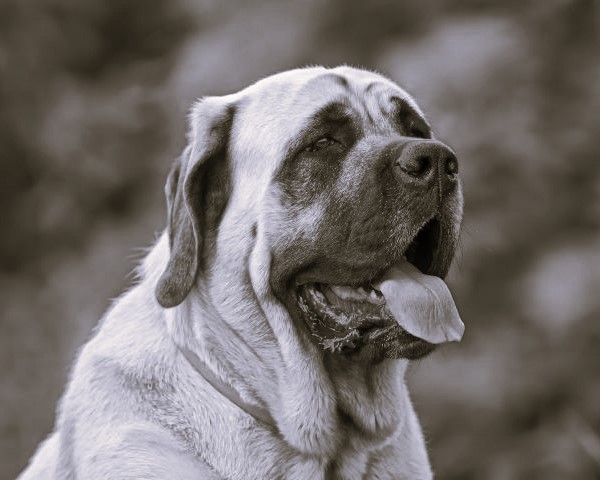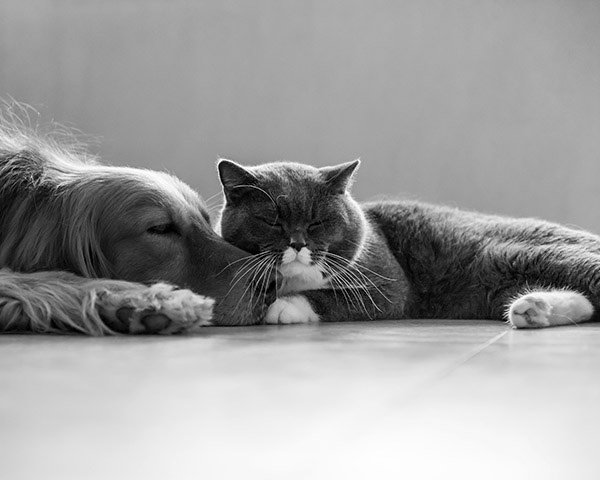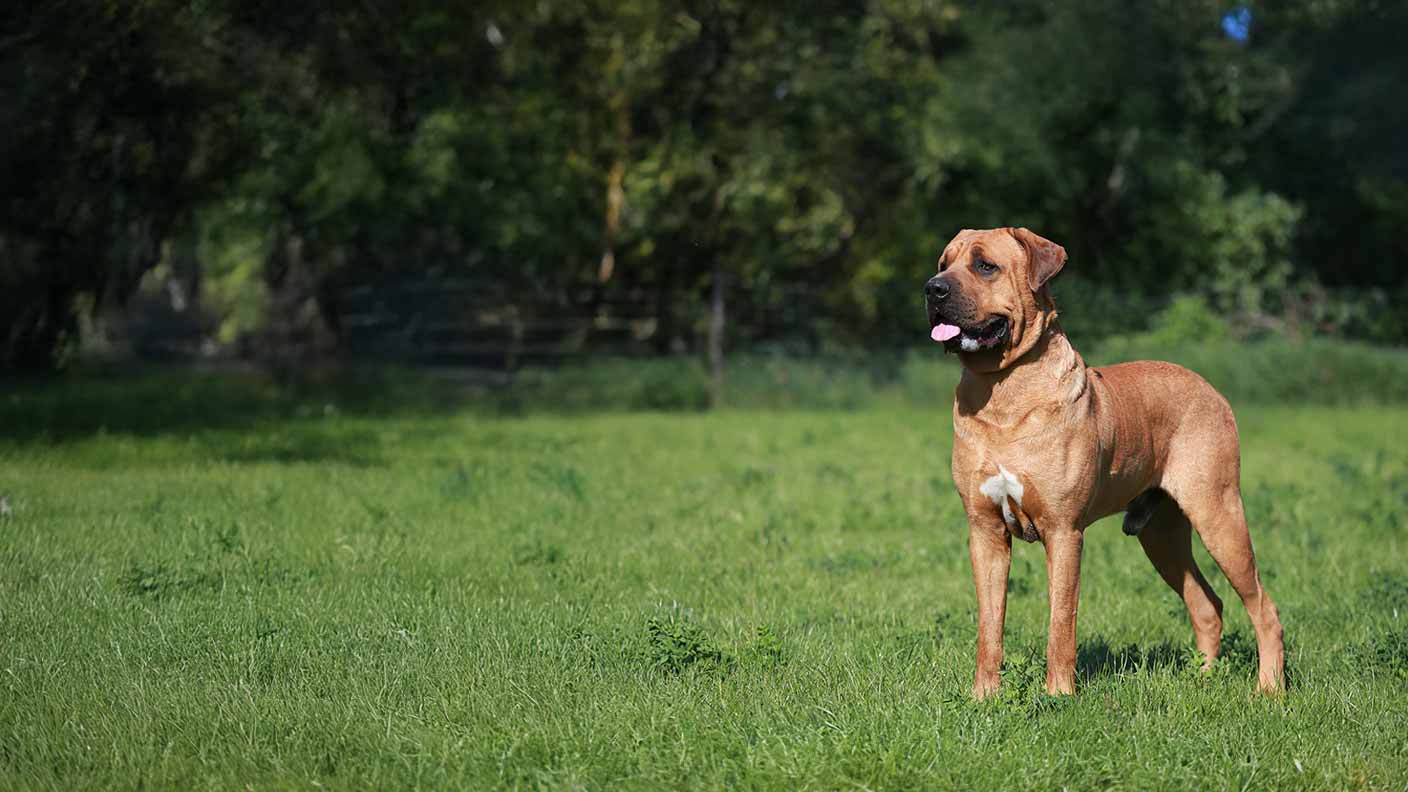Mastiff dog breed information and advice
The mighty Mastiff is an ancient breed with a storied history. Also known as the Old English Mastiff, this powerful breed dates back to 3,000 BC. The Mastiff was historically used as a guardian and war dog in England. They even battled lions, bears, bulls and human gladiators in the arenas of ancient Rome.
Despite their imposing, muscular form, Mastiffs are docile and friendly canines that are happy to laze about. This guide covers everything you need to know about the noble Mastiff before bringing one home, from grooming and diet to exercise.
Mastiff facts

| Lifespan | 6 - 10 years |
| How much | £250 - £2,500 |
| Size | 89 - 107 cm |
| Weight | males 72-104 kg, females 54-77 kg |
| Colours | apricot, brindle, fawn, silver fawn, dark fawn, red, black |
| Grooming | weekly brush and regular baths |
| Temperament | gentle, loyal, courageous |
| Exercise | around 60 minutes a day |
Pet insurance for your Mastiff dog
Like other large breeds, the Mastiff has a shorter lifespan than small-breed dogs. Having dog insurance can help to cover the cost of vet bills, treatment, medication and more, so you can keep your Mastiff fit and healthy throughout their lifetime.
Common health issues that can affect Mastiff dogs include:
Dogs can fall ill or have an accident at any age. If you’re lucky enough to have a mini Mastiff, why not take out puppy insurance? This makes sure your pup is covered from them being just eight weeks old.
Sainsbury’s Bank Pet Insurance
Cover your loyal Mastiff for illnesses, accidents and injuries with Sainsbury’s Bank Pet Insurance. We can pay your vet directly, so you can avoid mounting vet bills. And if you have more than one furry housemate at home, we also offer multi-pet insurance at a discount price.
Choose from three insurance options – each packed with benefits for your Mastiff.
- Lifetime – protect your Mastiff for a lifetime with up to £7,500 towards vet costs per year, 24/7 vet assistance and cover at home and abroad.
- Maximum benefit – claim vet fees per condition during the lifetime of the policy, up to the policy limit of £3,000 or £6,000.
- Time limited – cover vet costs for your Mastiff’s short-term health issues of up to £3,000 or for 12 months, whichever comes first.
You can cover your Mastiff with a new policy from when they reach eight weeks old.
Please note that we won't cover any pre-existing conditions and that terms, conditions, excesses, exclusions and limitations apply.
How to care for a Mastiff
Mastiffs are gentle giants that make the perfect companion. They’re eager to please, easy to train and a dream to groom – but they do drool a lot! As one of the more low-maintenance dog breeds around, you can keep your Mastiff happy and healthy for years to come.
Feeding and nutrition
As one of the largest and heaviest dog breeds , it’s no surprise the Mastiff has a colossal appetite. They require a lot of wet and dry food, but the amount varies depending on their age, lifestyle and activity level.
Mastiffs benefit from a nutritious and balanced diet, including minerals and vitamins to support their joints. Berries and certain veggies can also work for their diet, but it’s important to know what dogs can and can’t eat to avoid giving them an upset tummy – or worse.
Mastiff pups should be fed large-breed puppy food, then switched to an adult formula once they reach 18-24 months old . Be careful to not overfeed them as Mastiffs are prone to bloating and stomach problems. Small and frequent meals work best. Always check the food packaging for feeding guidelines if you’re unsure.
Grooming
Mastiffs have a short, dense coat that’s easy to groom. A quick brush every few days or once a week should suffice. This breed tends to heavily shed once or twice a year, so you’ll need to brush more frequently with a strong, toothed comb. This is especially important before giving them a bath.
One of the Mastiff’s most prominent features is the deep wrinkles around their head, eyes and muzzle. This extra, loose skin should be regularly inspected and cleaned. And don’t forget their drool! Always keep a cloth nearby to clean their face and jowls.
Exercise
Mastiff dogs were bred to be guardians of the home, so their exercise needs are lower than other breeds. They make the perfect couch potatoes and they love to relax and snooze indoors.
This breed requires at least one hour of exercise per day and will enjoy leisurely walks or gentle playtime. They have a tendency to plop down if they’re tired or overheated, so time their exercise appropriately. Avoid overexercising Mastiffs when they’re young – this can strain the muscles and joints and lead to skeletal problems.
Training
Mastiffs are devoted to their owners and eager to please, which extends to their training. They’re quick learners but can lose attention and focus easily. In that case, they might lie down and snooze.
Early training and socialisation for your Mastiff dog is a must. And like any giant-breed dog, they should be taught to walk on a lead and harness. Mastiffs respond well to praise and positive reinforcement. They’re also big on eye contact and can read body language and expressions well.
Keep training sessions short and fun with activities like search and rescue, tracking and pulling carts. Your Mastiff will thank you for it, and maybe even sit on your lap.
Temperament and behaviour
The Mastiff breed is deceptively obedient with a docile nature. But as you’d expect, they can be protective toward their beloved families. Overall, they’re loving and good-natured softies that get on well with everyone.
Socialising your Mastiff dog early on is important to ensure they are well-adjusted around strangers and animals. They’ll also require proper training to establish boundaries and prevent any behavioural issues. If that’s the case, we can help your Mastiff along with our behavioural therapy cover.
Common health problems
Mastiff dogs are classified as ‘Category Three’ by The Kennel Club. This refers to dog breeds that are more prone to having visible conditions and health issues due to how they were bred. Mastiffs can be susceptible to various conditions, so it’s important to keep up with regular vet checkups and help protecting them with dog insurance.
Epilepsy
Epilepsy is a brain disorder that causes fits and can be inherited in Mastiffs. It can be brought on by brain tumours or head traumas, but there is no exact cause. Epilepsy affects around 0.75% of dogs and typically starts between ages one and five.
Dogs with epilepsy may look dazed and unstable, or may collapse on their side and make jerking movements. They can also foam at the mouth and lose control of their bladder. Epileptic fits are unpredictable, but often occur when your dog is relaxed.
While there is no cure for canine epilepsy, medication can reduce the number of seizures in your Mastiff and sometimes prevent them altogether.
Entropion/Ectropion
Mastiff dogs can be predisposed to eye disorders including entropion (eyelids growing inward) and ectropion (eyelids drooping downwards). This is due to excessive skin over their face and eyes.
Both conditions are often genetically inherited, with symptoms including eye discharge and excessive watering of the eye. In most cases, entropion and ectropion can be treated with lubricating eye drops, injections or surgery.
Gastric Dilatation-Volvulus (GDV)
GDV, or bloating, is when the stomach fills with gas and twists around on itself. It typically occurs in deep chested breeds—including the Mastiff—right after they’ve had a big meal. This buildup of food and gas causes the stomach to expand, affecting normal breathing and blood flow.
Signs of GDV include retching, decreased appetite and general signs of abdominal pain. Dogs can be treated with surgery, and more severe cases may require the removal of badly affected stomach wall, spleen and intestine.
Cancer
Mastiff dogs can be prone to developing some forms of cancer including osteosarcoma (bone tumours), lymphoma, hemangiosarcoma and mast cell tumours. Each of these cancers may show different signs, from lameness or limping to small growths on the skin.
Treatment is available for certain cancers and usually involve surgery, radiotherapy or chemotherapy. If your Mastiff shows any signs of abnormal behaviour, repeated stomach problems, weight loss or more, seek advice from your vet immediately.
So, is a Mastiff right for you?
Big in size and personality, the Mastiff breed is truly a treasure. Thanks to their gentle temperament, they’ll fit in well with a family or as a sole companion. They can underestimate their strength and size, so always supervise them when with children.
Training and socialisation is crucial for this breed, so you’ll need to devote time, patience and a lot of love – but the Mastiff will return it in kind. They’ll enjoy lounging on the sofa with you and the occasional walk – perfect for equally relaxed pet parents.
If you love large dogs, have plenty of space to share and don’t mind a big food bill, the Mastiff could be the dog for you.
Frequently asked questions
Are Mastiffs hard to train?
No, Mastiffs are easily trained due to their obedience and eagerness to please. However, they can get bored easily, so repetitive training methods may not work as well. Short and fun training sessions with positive reinforcement can keep your Mastiff engaged.
Is a Mastiff a good family dog?
Despite their appearance, Mastiffs are gentle and noble dogs. They’re devoted to their owners and love being part of a family, making them a great addition to the home. They may not realise their own size and strength, so playtime with children must be supervised.
Do Mastiffs have health issues?
Mastiffs are prone to certain health issues that are typically inherited. They’re classified as ‘Category Three’ by The Kennel Club, which highlights their heath conditions caused by breeding.

Browse our guides
Choose from our list of helpful guides and information

Explore dog breeds
Find out how to keep your dog healthy and happy

Cat breed guides
How to care for your cat, common health problems and more
Terms and conditions
Important information
Sainsbury's Bank plc, Registered Office, 33 Charterhouse Street, London, EC1M 6HA (registered in England and Wales, no 3279730) is authorised by the Prudential Regulation Authority and regulated by the Financial Conduct Authority and the Prudential Regulation Authority (register no. 184514).
Sainsbury's Supermarkets Ltd is an appointed representative of Sainsbury's Bank plc. Sainsbury's Bank plc acts as an introducer to Pinnacle Insurance Ltd who is authorised by the Prudential Regulation Authority and regulated by the Financial Conduct Authority and the Prudential Regulation Authority (register number 110866). Registered office: 4th Floor, Limelight, Elstree Way, Borehamwood, Hertfordshire, WD6 1JH. Sainsbury’s Bank Pet Insurance is arranged, administered and underwritten by Pinnacle Insurance Ltd. Sainsbury's Bank plc and Pinnacle Insurance Ltd are not part of the same corporate group.
We do not provide personal recommendations to customers.
